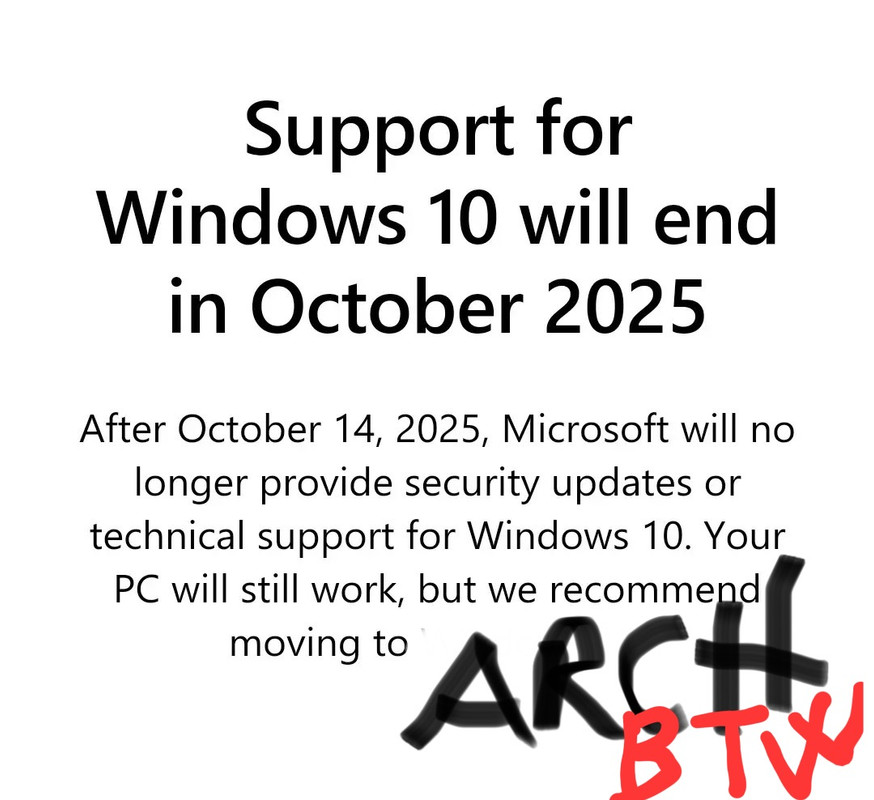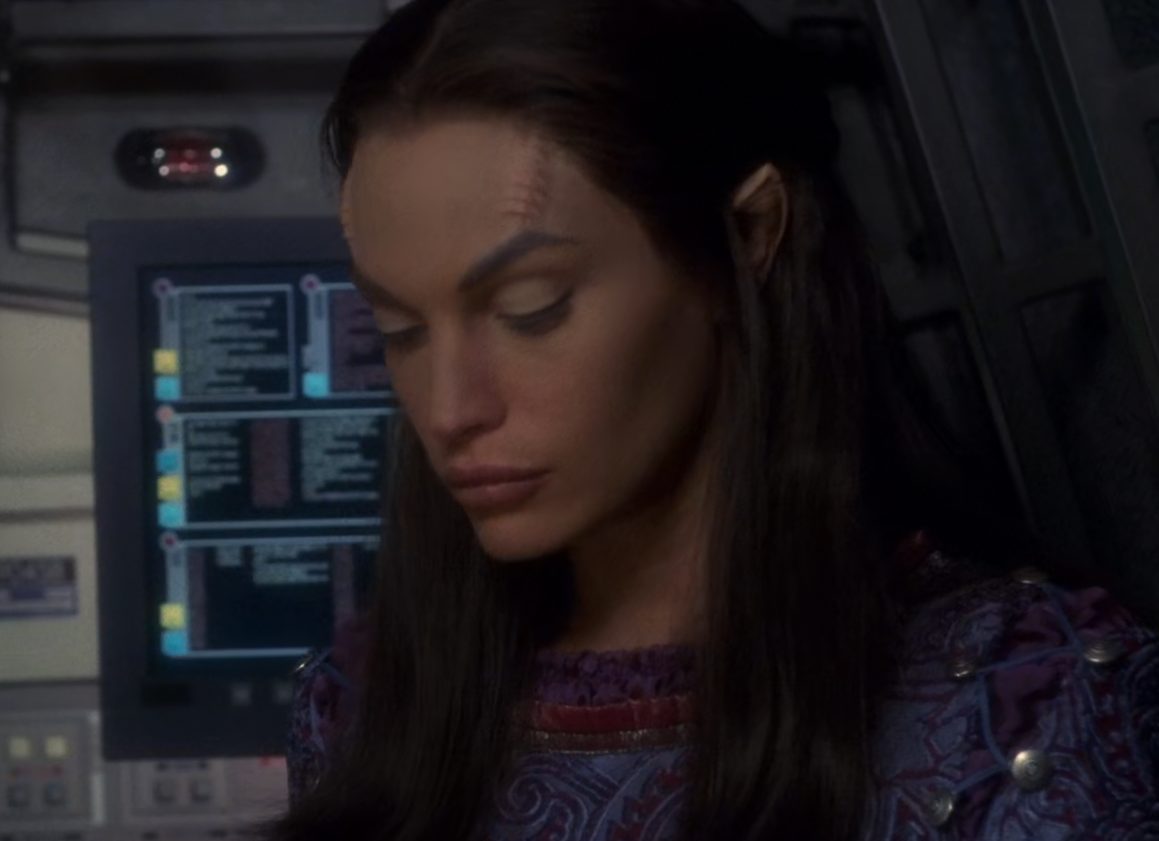- cross-posted to:
- chonglangtv@lemmy.world
- cross-posted to:
- chonglangtv@lemmy.world

Or OpenSUSE Tumbleweed
Huge respect for not putting Ubuntu
70% of the market. Half of those computers can’t even run windows 11. Good to see Microsoft taking charge in the fight against the environment by asking tens of millions of people to throw away their perfectly good computers and buy new ones
I can’t wait for some new bargain Linux machines.
For real. I’m genuinely trying to grasp why. Is it seriously just so they can require secure boot and then say Windows 11 is secure from ransomware even though that’s a feature of the motherboard and not the OS?
They have added so much ad stuff and other garbage that the OS is slowing down, to combat the user perception that the OS is slow they have increased the hardware requirement.
is this real? windows 10 literally came out yesterday
Remember when W10 was going to be the last windows you’d ever need.
Yes, it’s the last version of Windows I’ll ever need.
Yep, not moving on. I still have a lot of things to figure out though. Unfortunately windows is easier for a lot of things but I’m completely done.
Oh, I meant I’m going to use a different OS after 10.
This is linuxmemes after all…
To be fair, that is entirely accurate. It is the last windows I will ever need because I switched to linux.
I like how they end support for OS without providing an upgrade for a lot of people. Might as well put a Linux ad in their “Your PC is not supported” bullshit.
They even have a guide on how to install Linux: https://learn.microsoft.com/en-us/linux/install
So…
Windows 10: the “last” windows version
Release Windows 11, requires specific hardware that you can’t realistically add to your existing PC. But Windows 10 will keep being updated
Windows 10 is not getting anymore updates
Love it, no notes.
To be fair, my understanding is the “10 is the last version” idea came from a developer speaking in an unofficial capacity and the media ran with it. It may have never been true.
While that is technically true, Microsoft didn’t really make any effort to correct the misunderstanding, despite it being a widely reported story in tech.
I suspect they had a legitimate faction that was going to say “rolling release” and so they let it go.
shoving down mandatory AI down everyone’s throats I see? Probably part of a behind the scenes push by government or sth since they will be tracking and recording everything going forwards. I can even see people crying “But think of the AI!”
Linux mint cinnamon but cool cool
But what’s an ᗋR𝖢ꔠ?
You just summoned a demon
No I think it’s a daemon they summoned. Maybe the notification daemon?
Btw
Intel ARC grapHics cards?
Let’s be honest, real nerds use Gentoo

(I wish I was that advanced, maybe some day.)
a good starter distro but ideally you should make your own from scratch so you know what’s in it
Honestly you’re not a real one until you’ve written your own kernel entirely
You guys would have deployed your own internet protocol if this conversation continued
Writing your own internet protocol is a good idea but you shouldn’t stop there. You need to run your own internet cables too to make sure it does what you want and isn’t controlled by someone else.
And develop your own plastic to cover the cables?
And what are you going to cover with it if you haven’t even started mining your copper and inventing a machine to make your fiber optics.
Wait, maybe we need to start with the electromagnetic spectrum in general.
Oh my god😭
*mint
Can I use Video Editing programs like Vegas on Linux?
KDEnlive is useful for inline video editing, and Davinci Resolve is more of a pro level tool. I have no idea about Vegas.
Like Vegas? Sure. Open source stuff like kdenlive and shotcut exists. Davinci resolve is available for Linux for more professional stuff. Specifically Vegas? Probably only under a VM, and you’d likely get awful performance, so not worth it. If you’re a professional, Linux isn’t always an option, especially if you are in a software ecosystem that doesn’t work there
Windows 10 LTSC 2021 edition has support until January 13th 2032.
I’d obviously prefer if more people gave Linux a try but if you’re literally forced to use Windows then it’s probably your best option right now.
If my Nvidia graphics card played nicely, I would.
It’s my #1 complaint with Linux… Well Nvidia.
Not sure what you have, what your trying to do, and am pretty new to Linux myself, but I’m running KDE neon with a 3070, and after a little work to get drivers updated I’ve had minimal issues!
I’m not doing anything too crazy though, mostly web browsing and gaming is all.
Progress in that regard is actually pretty rampant lately, I can imagine by the time Windows 10 is EOL it will be no different from AMD.
*for 20-series and later graphics cards
Well, it will be slightly different. AMD releases open source drivers. That’s why it works so much better. Nvidia releases proprietary ones and let’s the community handle the open source ones. To the end user, there probably won’t be much difference eventually, but it does hurt progress so they’ll always be slightly behind where they could be.
Is this for real? They’re already quitting support for win10? Ain’t no fucking way I’m going to win11 so Linux it is I guess.
Bro linux is SO FUCKING GOOD nowadays, you’re going to love it. Debian, Arch, whatever its all gravy
I’m to dumb for ARCH, and I find default Fedora and Ubuntu very annoying (although I haven’t tried them in a while). I did have a good experience with mint several years ago. What distros should I consider?
Mint is still basically mint from several years ago. Having tried a dizzying array of them it continues to be easy and hated on because it doesn’t involve text based configing your life away. That said, because it lags behind compared to other distros in updating the kernel, the thing that makes new hardware work, it can have a hard time with things made recently. Try the edge ISO, which has a newer kernel. The team is working on more frequent updates, Wayland (a thing you ideally never have to ever know what it is), and just delivers a comfortable desktop experience since I first screwed up my computers with Linux in 2007.
Is LMDE easy tok? Snaps scare me. (I have Nvidia 30xx btw.)
The Ubuntu version is still probably the best. You won’t have to think about graphics drivers or printers. It all sort of just… Works. They rip the awful out of Ubuntu and keep the excellent, world class, support in place. You’d be hard pressed for find a better commercial and non-commercial support. You can easily search for any problems you do run into and there will not be some esoteric DISCORD as your support. There are countless forms with literally thousands of people probably somewhat knowledgeable on how to address issues. Things like CUDA and dev work are also extremely supported. My barometer is how much time I have to crap away to get a printer and scanner work. Both of which just work with Linux Mint out of the box.
Linux Mint, Pop!_OS and ZorinOS are pretty nice for new users. If you want to get a little more advanced, maybe check out something like Fedora Atomic (e.g. Kinoite, Silverblue) or Universal Blue (Bazzite, Aurora, Bluefin). Arch isn’t actually that hard, they have an installation script that makes everything super easy (https://www.youtube.com/watch?v=8YE1LlTxfMQ), or you could watch a video on how to install it manually (https://www.youtube.com/watch?v=_JYIAaLrwcY, https://www.youtube.com/watch?v=YC7NMbl4goo)
Hell my win10 pc hasnt had an update since '21 so no great loss
That computer better be air gapped. Security updates are essential.
i know you guys are probably right when you say that security updates are important, but why exactly? give me an example of how i could be fucked over while i’m just mindlessly playing my steam games and watching twitch+youtube on a system that hasn’t been updated since 2016.
i blindly assume that as long as i don’t download and run stupid .exes or click stupid links, i am completely fine
You don’t need to click anything suspicious. Remote code execution has in the past been done through images, PDFs, comments on some webpage, or supposedly trustworthy games. Just recently, Minecraft would let an attacker run anything on the victim’s computer due to a vulnerability in Log4j.
If your computer is not directly exposed to the internet, you might get away with some security updates that for example fix vulnerabilities that target the system firewall. But the point is, you’re constantly exposing yourself to attackers without knowing so.
A few example vectors:
-
Cross-Site Scripting (XSS) allows an attacker to run arbitrary code on the victim’s browser. All that’s required is a website that doesn’t validate its input properly. That is, an attacker can write executable code into a YouTube comment and when you view that comment, your computer will execute that code. Obviously YouTube is secured against that, but there are plenty of websites where this attack can be done. Therefore, modern browsers isolate the code execution to only that “browser tab”, so the attacker can’t access some sensitive data (unless the browser has some undiscovered vulnerability or for example the page itself contains sensitive information, say your bank account details). While modern browsers should provide sufficient protection against such attacks, the take-away point is that you don’t necessarily need to click any “suspicious links”. A vulnerability in a well-known website you frequent could be discovered any day.
-
An attacker can easily make your PC go to their website when typing google.com. DNS (how your computer is able to tell which web address is which computer) is not encrypted. It is incredibly easy tamper with. Why you don’t get scammed everyday is because of TLS encryption. Your computer is able to tell that the website is not Google, because it doesn’t have Google’s cryptographic “keys”. Assume that we discover a vulnerability in TLS (encryption of webpages) tomorrow and you refuse to update your operating system. Suddenly, an attacker can route any traffic they’d like back to them and you would be none the wiser. Same thing would happen if some vulnerability is discovered in X509 certificates, if ICANN’s private keys are leaked, and so on.
There are a lot of things that could go wrong. And they go wrong daily. Security updates fix vulnerabilities that we constantly find. They may be updates for your browser, your games, or indeed your operating system, depending on where that vulnerability is. The examples I gave are exaggerated, because they’re meant to be simple to understand. We do not find vulnerabilities in TLS every single day. Still, weak points are being discovered and fixed constantly. One of the bigger exploits were Spectre/Meltdown (attacks on the CPU) that let an attacker read any data they want, provided they can simply run some code on your computer in some way.
Also, obviously, if you expose yourself to the internet directly (e.g. port forwarding) or connect to an unsecure WiFi network, you’ll be bombarded with automated attacks that exploit holes found in firewall and the likes. If you open a port on your computer right now, you’ll get around a few hundred such knocks per day.
There are plenty of videos online that display what happens if you for example use a Windows 95 computer, either directly exposed to the internet or not. Might be worth watching to see just how easy it is for attackers to take over in the case of such an ancient system. Same principles apply to newer systems as well, the attacks are just more complex.
thank you for the explanation and the examples :) i will no longer be so ignorant about security updates
-
It has no internet connection, so no
You mean yes lol. That’s air gapped.














